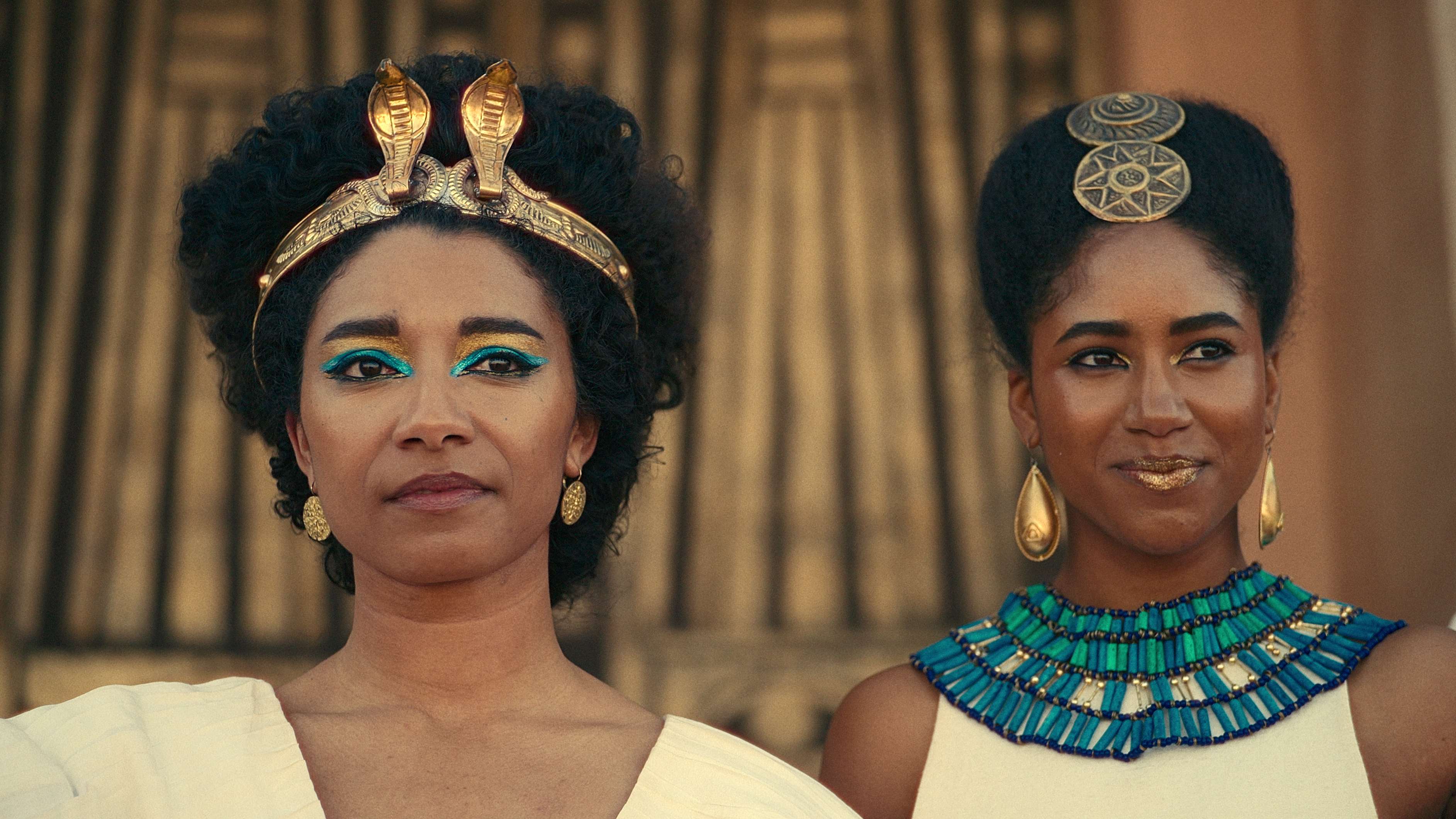On May 10, Netflix released the four-part docuseries Queen Cleopatra. Executive produced by Jada Pinkett-Smith as part of her African Queens series, the show sheds light on the extraordinary life of Cleopatra VII, the final pharaoh of Egypt. The series, however, presents a narrative through a combination of expert testimonies and captivating dramatic reenactments.
While Queen Cleopatra has generated significant attention and sparked important conversations, it has also faced criticism regarding the depiction of Cleopatra. Concerns have been raised by viewers and scholars alike, who argue that this portrayal can be seen as a form of cultural misrepresentation and historical revisionism. They emphasize the importance of respecting and accurately representing Egyptian culture and heritage.
The current Tomatometer score of Queen Cleopatra stands at a disappointing 15%, indicating a negative reception from official reviews. Additionally, the audience score is a mere 2% (a record on its own?), reflecting the widespread dissatisfaction among non-professional users who took the time to express their dislike for the show.
In the following article, we dive into Queen Cleopatra in detail, pointing out everything it gets right and wrong.
What is the show about?
Jada Pinkett Smith has been developing a documentary franchise that delves into the lives of influential and legendary African Queens. With Queen Cleopatra, the focus is put on the extraordinary ruler who has been both revered and misconstrued throughout history.
Recognizing that her intelligence was her true strength, the series aims to shed light on her political acumen, challenging the prevailing narratives that have predominantly focused on her beauty and romantic affairs.
By reevaluating Cleopatra’s intriguing journey, the show also wishes to explore the ongoing debates surrounding her heritage, adding a compelling layer to her legacy.
Is Queen Cleopatra historically inaccurate?
Queen Cleopatra, and for being an alley – Netflix, has faced criticism from historians who have pointed out several inaccuracies, particularly regarding the depiction of Cleopatra’s race. Experts have emphasized that Cleopatra belonged to the Ptolemaic dynasty, which traced its ancestry back to Ptolemy I Soter, a Macedonian Greek general serving under Alexander the Great.
In a statement on their official website, Egypt’s Ministry of Tourism and Antiquities affirmed, “Various antiquities of Queen Cleopatra, such as statues and depictions on coins, clearly portray her with Hellenistic (Greek) features, including fair skin, a prominent nose, and thin lips.”
Dr. Zahi Hawass, the former Minister of State for Antiquities Affairs in Egypt, expressed his disagreement with the accuracy of the upcoming Netflix film in a Facebook post, stating that “Cleopatra was Greek and resembled the queens and princesses of Macedonia.”
Contributing to the documentary, historian Islam Issa, author of “Alexandria: The City That Changed the World,” acknowledged Cleopatra’s Macedonian-Greek heritage as well-established. However, he cautioned against imposing modern notions of race onto Cleopatra’s ethnicity.

In an article for Al Jazeera, Issa wrote, “Applying today’s binary racial terms to Cleopatra’s context is anachronistic. Ethnicities, apart from Jews, were not extensively recorded in early Egyptian history. In Alexandria, there was no singular racial norm, as the genetic makeup was diverse due to the presence of people from various regions, including Europeans and Nubians, who lived and intermarried.”
Issa emphasized that claiming Egypt had no dark-skinned individuals or asserting that the origins of Egyptian civilizations were solely sub-Saharan African would both be forms of erasure.
However, it is important to note that despite Cleopatra’s well-documented life, our knowledge about her remains incomplete. The destruction of her dynasty during her war with Rome and subsequent riots in Egypt resulted in the loss of numerous records. While some representations of Cleopatra created during her lifetime exist, such as the purportedly most accurate surviving bust, most writings about her come from much later authors.
According to the Greek historian Plutarch, who wrote about 150 years after Cleopatra’s death, she may have been the first among the Ptolemaic rulers to make an effort to learn the Egyptian language. Regardless of her physical appearance, it is plausible that she identified herself primarily as Egyptian.
In summary, while historical accounts offer valuable insights into Cleopatra’s life, the available evidence allows for various interpretations, and the complex nature of her identity should be considered within its historical context.
Why is ‘Queen Cleopatra’ under controversy?
The casting of Black actress Adele James as the titular queen in the series ignited controversy, with critics claiming that her portrayal is historically inaccurate and labeling it as “cultural appropriation.”
Shortly after the release of the series trailer, Netflix had to disable comments on YouTube due to a significant amount of racial abuse and hostile commentary. Moreover, a Change.org petition accusing Netflix of “falsifying history” gathered 85,000 signatures before being removed from the platform.
Statues of Queen Cleopatra confirm that she had Hellenistic (Greek) features, distinguished by light skin, a drawn-out nose and thin lips. 2/2 pic.twitter.com/t1E8LGMVIc
— Ministry of Tourism and Antiquities (@TourismandAntiq) April 30, 2023
While controversies like these can sometimes arise from online audiences getting worked up about trivial matters, it is worth noting that the series has also faced criticism from Egyptian officials. Egypt’s Ministry of Tourism and Antiquities argued that a documentary-style series should prioritize accuracy and rely on historical and scientific facts. They emphasized that statues of Queen Cleopatra depict her with Hellenistic (Greek) features, such as fair skin, a distinctive nose, and thin lips.
Dr. Mostafa Waziri, the secretary-general of the Supreme Council of Antiquities, denounced the portrayal of Cleopatra in the series as a “falsification of Egyptian history” and a clear historical fallacy.
Egyptian lawyer Mahmoud al-Semary even went so far as to demand that the authorities ban the show in the country, accusing Netflix of distorting “Egyptian identity” to promote “Afrocentric thinking.”
Where was the show shot?
Netflix’s Queen Cleopatra was primarily filmed in Ouarzazate, Morocco, renowned for housing the Atlas Studios. Popular shows like Game of Thrones and movies like Gladiator and Kingdom of Heaven have previously used this location to give authenticity to their period settings.
Utilizing the vast resources of Atlas Studios, most of the scenes for this new docudrama were shot here to create a setting reminiscent of ancient Egypt. The studio had previously served as the production site for the 1999 mini-series Cleopatra, providing the necessary materials and infrastructure for the current production.
In staying true to the essence of Cleopatra’s story, the production also ventured to historic locations within Egypt itself. The awe-inspiring Valley of Kings and the iconic Giza Necropolis, both integral to the rich history of Egypt, were utilized in the filming of the show.
When and where can I stream ‘Queen Cleopatra’?
Queen Cleopatra, which is a part of Netflix’s African Queen documentary series, is a Netflix Original. If you have a Netflix subscription, beginning May 10th, 2023, which is the debut release date, you will be able to watch the docuseries for free. You can head here and watch it right now.








